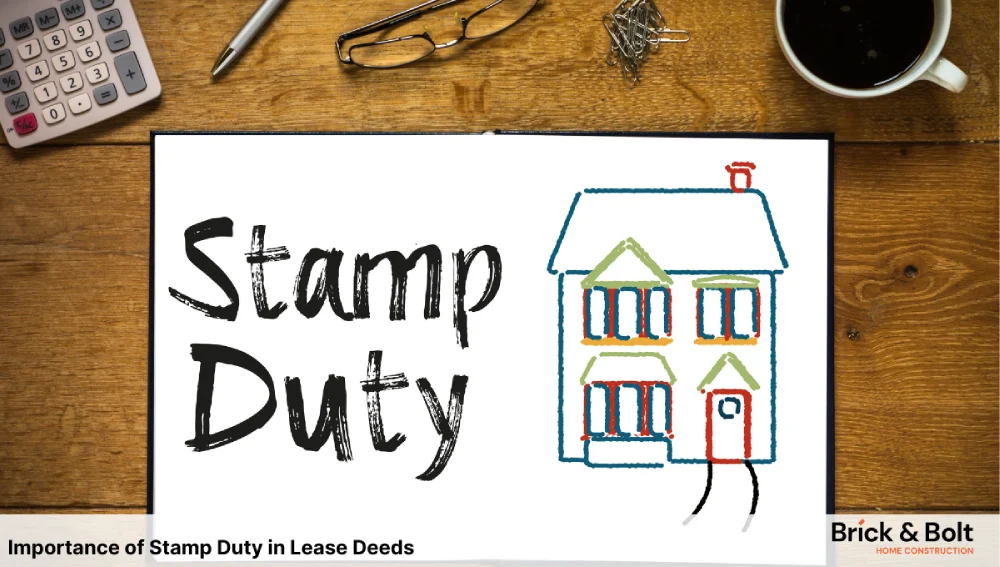A lease deed is an important legal document that contains an agreement between the property owner and the tenant. The agreement is temporary, and the tenant has no right to claim ownership as it is just rented for some time.
The deed is registered by the government authorities and is protected legally by both parties. One important element of deed registration is the payment of stamp duty.
What Stamp Duty Is and Its Purpose in Lease Deed Registration
Stamp duty is a tax put forth by the state government on particular documents, namely lease deeds. The lease deed stamp has two purposes.
Generation of Revenue: Stamp duty taxes serve as an important source of income for the state government.
Authentified Document: The presence of stamps in the lease documents forbids tampering or misuse of the document in the future.
It protects both the owner and tenant through government policies.
Importance of Stamp Duty in Lease Deeds

The lease stamp duty in a lease deed not only indicates taxation but is also a legal aspect that protects the property. It is a public-registered document signifying the completion of payment and transfer of the property.
Certain essential components represent the importance of stamp duty lease deeds.
Validity: A lease deed is considered invalid without a lease deed stamp, and the victim cannot be defended by law.
Evidence: In cases of dispute, a lease deed document containing the lease deed stamp can be placed as evidence.
Registration: Registering lease deeds with authorities plays an important role in claiming rightful ownership and tenantship in cases of dispute. To register the document, payment of duty stamp play is crucial.
How Stamp Duty Applies to Lease Deeds
The stamp duty payable on a lease deed differs depending on state government regulations. In the state of Karnataka, two types of scenarios should be followed to get the stamp duty for the lease.
Leasing Type: The type of leasing is important. Leasing a property includes both commercial and residential.
Duration of the Lease: The shortest duration for which a lease can be signed is between three and five years, and the longest is ten years.
Legal Requirements for Paying Stamp Duty on Lease Deeds
The Indian Stamp Act of 1899 and the state government amendments gave all the details required for paying the stamp duty on lease deeds.
The legal requirements that are needed to get stamp duty on lease deeds are described below:
Stamp Paper: Stamp paper is used to print the lease deed containing the details with the exact value as calculated per stamp duty.
Payment: The stamp duty payment can be made through different methods, including online payment methods, challans, or demand drafts.
Time Commitment: After the lease deed is released, the stamp duty has to be paid within two months from the date.
Registrations: Once the stamp duty is paid, the lease deed will be presented to the local sub-registrar’s office within a time frame.
Documents Needed for Stamp Duty on Lease Deeds
Certain legal documents must be carried while going for a lease stamp duty on lease deeds.
1)Lease Agreement
A lease agreement is a blueprint that needs to be align on it’s lease Deed format with the conditions between the tenant and the landlord. This agreement includes specifics such as the real amount of rent, the duration of the lease, the responsibilities of both parties, and the maintenance obligations. Violations of the agreement will lead to legal action.
2) Proof of Ownership
The land owner has to provide documents to establish their ownership before leasing it. This includes a sale agreement, registry docket, or tax receipt.
3) Proof of Identification
A PAN, Aadhaar card, or passport issued by the government should be submitted by both the tenant and landlord.
4)Photographic Evidence
The tenant and landlord should submit two passport-sized photographs.
5) Challan or Demand Draft
Payment proof can be any receipt like a challan, an online payment confirmation, or a demand draft.
6)Witness
Two witnesses are required to sign the lease deed. The witnesses should provide their ID proofs.
Differences in Stamp Duty for Various Types of Lease Deeds
The difference between the stamp duty and the amount required to pay for the stamp depends on the property.
Residential Lease:
According to the Department of Stamp Duty and Registration Fees in the Karnataka,
One Year: Average annual rent (AAR): 0.5% + premium + advance + Rs. 500 fine + Rs. 100 stamp paper.
Ten Years: Annual rent of 1% + annual deposit paid + Rs. 100 of stamp paper
Above Ten Years: Annual rent of 2% + annual deposit paid + Rs. 100 for stamp paper.
Commercial Lease:
In the case of a commercial lease, it is advised to consult a lawyer. The stamp duty amount payable is higher for commercial leases compared to residential leases. The government guidelines keep shifting, and keeping up with the current guidelines and specific rates including the Lease Deed Registration Fees, is important.
Conclusion
Paying for stamp duty is a legal demand that ensures the document is secured under government policies and laws. There are different types of lease stamping each with its demands and requirements. Contact legal help, pay the stamp duty on the lease deed, and secure it to prevent disputes.
FAQs
The stamp value is calculated based on the type and duration of the lease.
Stamp duty charges vary for different states. In UP, the stamp duty rate is 4% of the annual rent and deposit amount.
The five hundred rupee stamp paper is used for a partnership deed or power of attorney.

